
Barcode: 325235
Flavored Jelly Confectionery
DOUBTFUL
📝 Reason: Certain components in this product have ambiguous Islamic rulings. Consultation with a qualified Halal certification authority is strongly recommended before consumption.
🏷️ Category: Candy
📄 Certificates: Our Delicious Recipe, Contains Wheat, Gluten., No Artificial Sweetener, Nutrition Information, Servings Per Package: 7.2, Serving Size: 25G (Approx. 5 Pieces)
Ingredients:
Details
Understanding the Halal Status of Flavored Jelly Confectionery
The Flavored Jelly Confectionery is a popular choice for candy lovers, but its Halal status remains doubtful. This uncertainty stems from certain ambiguous components within the product that may or may not adhere to Islamic dietary laws. To make an informed decision, it’s crucial to delve deeper into its ingredients and E-numbers.
Ingredients Breakdown
Let’s examine the ingredients in detail:
- Glucose Syrup: Permissible in Islam.
- Cane Sugar: Permissible in Islam.
- Gelatine: This ingredient raises concerns. It is advisable to check for a Halal logo, as the source and preparation method greatly influence its Halal compliance.
- Water: Permissible in Islam.
- Thickener (Acid Modified Wheat Starch): Permissible in Islam.
- Food Acid (Citric): Permissible in Islam.
- Natural Flavors: Typically considered permissible, but origin must be verified.
- Glazing Agent (Vegetable Oil, Carnauba Wax): Permissible in Islam.
- Natural Food Colors (Anthocyanins, Curcumin, Paprika Oleoresins): All considered permissible in Islam.
- Fruit Juice Concentrate: Permissible in Islam.
- Spirulina Extract: Permissible in Islam.
- Cornstarch: Permissible in Islam.
- Gluten: Generally permissible, given it comes from Halal sources.
E-Numbers and Their Status
The confectionery’s ingredients largely fall within permissible categories according to Islamic guidelines. However, as specified:
- While most components like glucose syrup, cane sugar, and various natural colors are considered halal, **gelatine** remains uncertain without a Halal certification. Its sourcing and extraction process can potentially involve non-Halal methods.
Why the Halal Status is Doubtful
The doubt arises particularly from the gelatine used in the formulation. Many consumers are concerned about its origins, as gelatine can be derived from pork or non-Halal certified sources. Without explicit Halal certification on the packaging, it’s challenging to ascertain whether the gelatine is compliant with Islamic laws.
As a consumer, if you adhere strictly to Halal dietary restrictions, it’s recommended to consult a qualified Halal certification authority regarding this product before consuming it. This will ensure that your dietary practices remain aligned with Islamic law.
Brand Context and Certification
The Flavored Jelly Confectionery doesn’t specify a brand name here, which can also complicate the Halal verification process. Brands committed to producing Halal products typically have certifications visible on their packaging. Thus, it’s advisable to look out for these certifications or logos to help make informed choices.
In addition, the product label mentions several aspects such as “No Artificial Sweetener” and offers nutritional information, which is a plus for health-conscious consumers. A smart move would involve leveraging Halal product directories or certification bodies for guidance.
Conclusion
While Flavored Jelly Confectionery is a delightful treat for many, its Halal status is detailed yet complex. Be cautious, especially regarding the gelatine content, and engage with relevant Halal authorities or resources to confirm its acceptability for your dietary preferences.
